Feed a Siberian husky puppy high-quality puppy food with plenty of protein and essential nutrients. Avoid high-carb fillers.
| Age to start solid food | 3-4 weeks |
| Feeding frequency (under 4 months) | 4 meals per day |
| Feeding frequency (4-6 months) | 3 meals per day |
| Feeding frequency (6+ months) | 2 meals per day |
| Puppy food type | High-quality puppy formula |
| Protein content in puppy food | 22-25% |
| Fat content in puppy food | 8-12% |
| Caloric needs (4-6 months) | 800-1,200 calories per day |
| Gradual switch to adult food | Start at 12 months |
| Water availability | Always accessible |
Choosing high-quality puppy food is crucial for the overall well-being of a Siberian Husky puppy. Premium puppy food formulated specifically for huskies offers a host of benefits.
It contains a well-balanced proportion of proteins, fats, and essential nutrients, all of which are essential for the puppy’s growth and development. High-quality puppy food ensures that the husky receives the necessary nutrients in the right quantities, promoting healthy muscle and bone development.
Additionally, these specially formulated foods often contain essential fatty acids, such as omega-3 and omega-6, which are vital for maintaining healthy skin and a lustrous coat. By selecting high-quality puppy food, husky owners can provide their puppies with the optimal nutrition required for a healthy start in life.
Choosing high-quality puppy food is crucial for the overall well-being of a Siberian Husky puppy. Premium puppy food formulated specifically for huskies offers a host of benefits.
It contains a well-balanced proportion of proteins, fats, and essential nutrients, all of which are essential for the puppy’s growth and development.
What to feed a siberian husky puppy
High-quality puppy food ensures that the husky receives the necessary nutrients in the right quantities, promoting healthy muscle and bone development. Additionally, these specially formulated foods often contain essential fatty acids, such as omega-3 and omega-6, which are vital for maintaining healthy skin and a lustrous coat.
By selecting high-quality puppy food, husky owners can provide their puppies with the optimal nutrition required for a healthy start in life.
Discover the secrets to nurturing a well-rounded and content Husky by exploring premium food options. For insights on curbing unwanted biting behaviors, dive into our comprehensive guide on training your Husky to exhibit better bite inhibition.
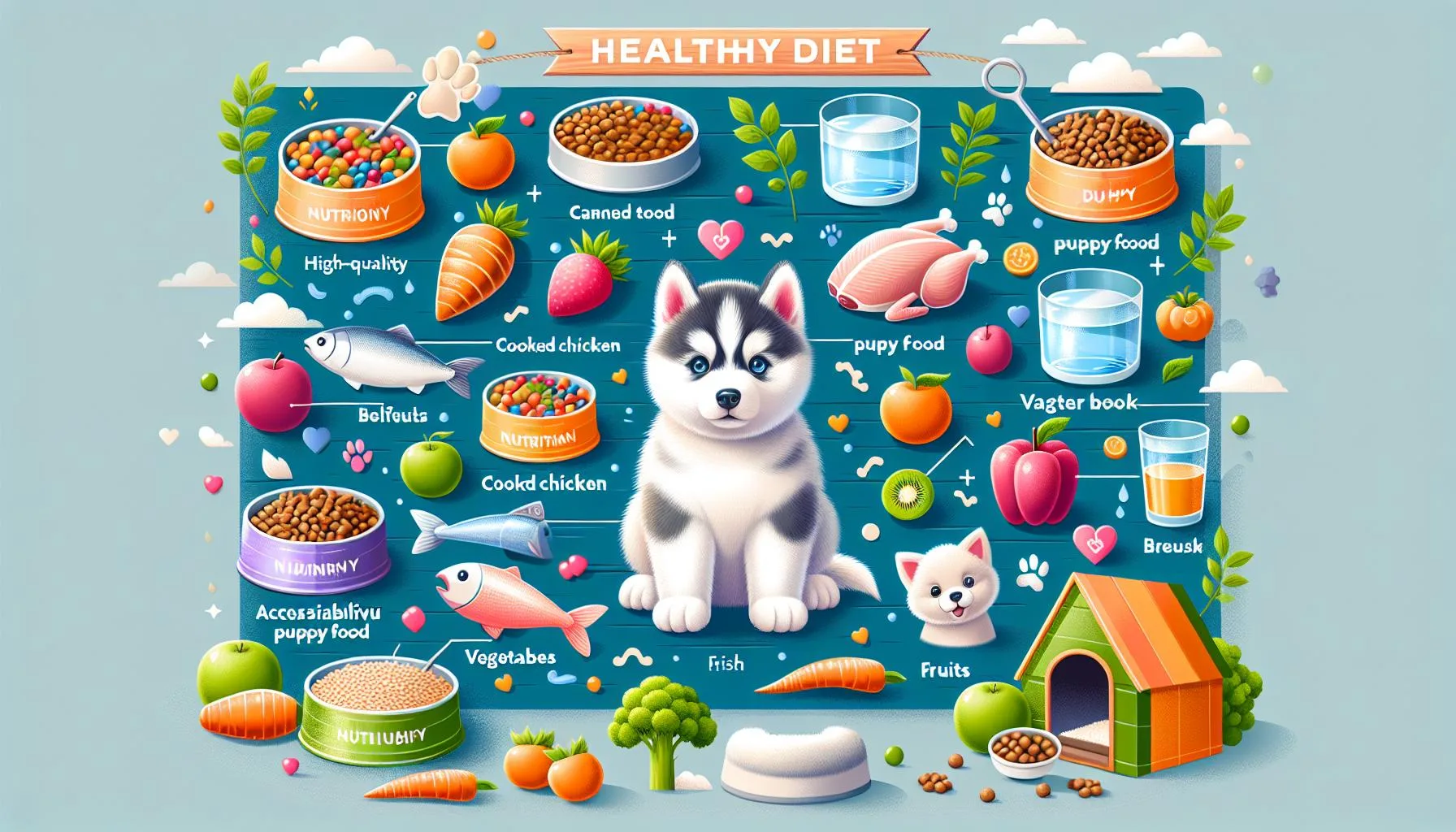
Protein: The Building Block of Your Husky’s Diet
Protein serves as the fundamental building block in a Siberian Husky puppy’s diet, playing a pivotal role in fostering muscle development and ensuring overall growth. Adequate protein intake is essential during the puppy stage, as it supports the formation of strong muscular structure and promotes healthy growth.
High-quality animal protein sources such as lean meats, poultry, and fish are ideal selections to fulfill a Husky puppy’s protein requirements, supplying the necessary amino acids crucial for their development. Additionally, incorporating protein-rich puppy food formulated specifically for the breed can effectively provide the essential nutrients needed for their energetic and active nature.
What to feed a Siberian Husky puppy largely revolves around the inclusion of premium protein sources to fortify their physical development.
What to feed a siberian husky puppy
Protein is the cornerstone of a Siberian Husky puppy’s diet, nurturing muscle growth and overall vitality during their formative stages.
Sufficient protein is critical to meet their energetic demands and support their physical development. Opting for high-quality animal protein sources and specialized puppy food formulated for Huskies ensures that they receive the vital amino acids necessary for their growth and well-being.
To delve deeper into the specifics of canine growth and the impact of protein on their size, explore our detailed guide on the development patterns of one breed in particular. Learn the intricacies of Husky Growth and Weight Expectations to better understand how nutrition shapes their physical development.
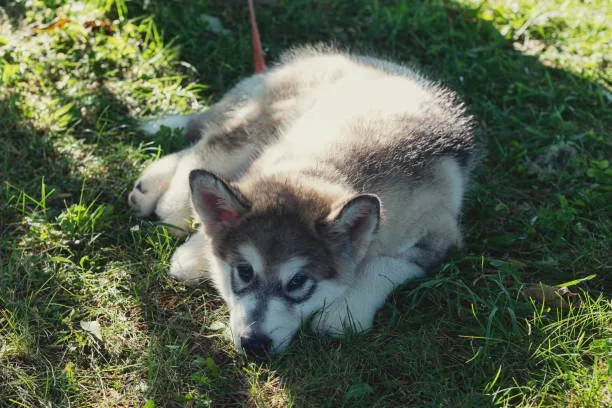
Balancing Fats and Carbohydrates for Sustained Energy
A Siberian Husky puppy’s diet should prioritize a balance of fats and carbohydrates to sustain their high energy levels. Fats play a crucial role in providing energy and aiding the absorption of essential vitamins.
When determining what to feed a Siberian Husky puppy, it’s important to select high-quality sources of fats, such as omega-3 and omega-6 fatty acids, to support their active lifestyle. Additionally, including healthy fats from sources like fish oil or flaxseed can promote a lustrous coat and overall well-being for the puppy.
While carbohydrates can provide quick energy, excessive fillers in a puppy’s diet should be avoided to prevent unnecessary weight gain and potential digestive issues. Opting for complex carbohydrates from sources like sweet potatoes, peas, and whole grains can offer sustained energy without causing spikes in blood sugar levels.
When providing a balanced diet for a Siberian Husky puppy, the focus should be on the right proportions of fats and carbohydrates to support their energy needs without compromising their overall health.
It’s important to select high-quality sources of healthy fats, such as omega-3 and omega-6 fatty acids, to support their active lifestyle and promote a lustrous coat.
What to feed a siberian husky puppy
Complex carbohydrates from sources like sweet potatoes, peas, and whole grains can offer sustained energy without causing spikes in blood sugar levels.
To delve deeper into the dietary needs and overall wellness of your furry companion, explore our comprehensive resource on husky health and longevity. Gain valuable insights that could impact your puppy's vitality and lifespan by visiting Understanding Husky Lifespan and Health.
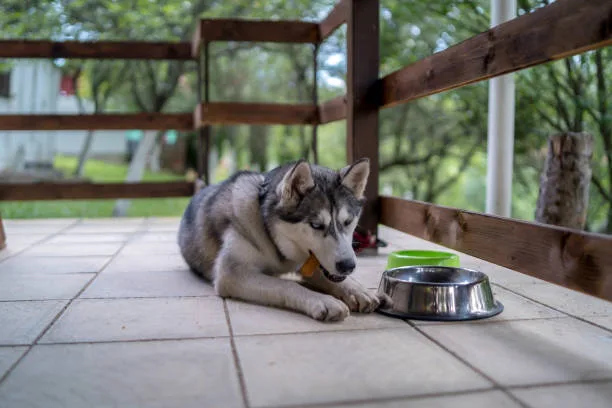
The Role of DHA in Brain and Eye Development
DHA, an omega-3 fatty acid, plays a significant role in the cognitive and ocular development of Siberian Husky puppies. As a breed known for its intelligence and sharp senses, it is vital to prioritize their brain and eye health from a young age.
Including DHA in their diet supports the development of their cognitive abilities, helping them learn commands and adapt to training more effectively. Additionally, DHA contributes to their visual acuity, aiding in their ability to navigate the world around them.
Therefore, when considering what to feed a Siberian Husky puppy, it is crucial to choose food that is rich in DHA to promote their overall brain and eye development, ensuring that they grow into alert, perceptive, and responsive adult dogs.
DHA, an omega-3 fatty acid, plays a significant role in the cognitive and ocular development of Siberian Husky puppies.
As a breed known for its intelligence and sharp senses, it is vital to prioritize their brain and eye health from a young age.
Including DHA in their diet supports the development of their cognitive abilities, helping them learn commands and adapt to training more effectively.
Additionally, DHA contributes to their visual acuity, aiding in their ability to navigate the world around them.
Therefore, when considering what to feed a Siberian Husky puppy, it is crucial to choose food that is rich in DHA to promote their overall brain and eye development, ensuring that they grow into alert, perceptive, and responsive adult dogs.
Understanding the role of DHA in the development of your Husky puppy's brain and eyesight is just the beginning. Discover more about managing your energetic companion's behavior by reading our comprehensive guide on calming Husky puppies.

Vitamins and Minerals: Essentials for a Healthy Puppy
A Siberian Husky puppy’s diet should be carefully balanced to ensure they receive all the necessary vitamins and minerals for healthy growth. Essential vitamins like A, D, E, and K play critical roles in supporting the puppy’s immune system, bone development, and overall wellbeing.
Additionally, minerals such as calcium, phosphorus, and zinc are vital for strong bones, teeth, and muscle function. Including a variety of fruits and vegetables in the puppy’s diet can help provide essential vitamins such as vitamin C and fiber for proper digestion.
Ensuring the puppy’s meals contain a well-rounded mix of essential vitamins and minerals will contribute to their overall health and development.
To delve deeper into the intriguing expressions of our canine companions, we invite you to explore an insightful article examining the unique facial features of Siberian Huskies that often lead to misconceptions about their mood. Discover the truth behind the stern looks of these majestic dogs by visiting the mysteries behind Huskies' expressions.
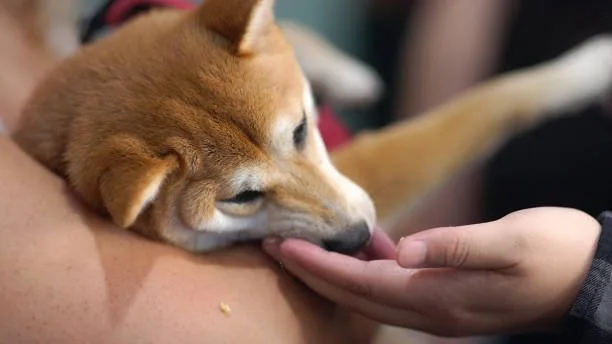
Measuring and Monitoring Your Husky Puppy’s Portion Sizes
American Kennel Club: What to feed a siberian husky puppy
Feeding a Siberian Husky puppy the right portion sizes is crucial for their healthy development. A general guideline is to provide 1/2 to 1 cup of high-quality puppy food, divided into three meals per day, especially for younger Husky puppies.
As they grow, the portion sizes can be adjusted to meet their energy needs while preventing overfeeding. Monitoring your puppy’s body condition and weight is essential in determining if the portion sizes need to be adjusted.
Ideally, you should be able to feel your puppy’s ribs without them being visible. This indicates that they are at a healthy weight.
It’s important to remember that each puppy is unique, so consulting with your veterinarian for personalized portion recommendations based on your Husky puppy’s growth and activity levels is always a good practice. Overfeeding can lead to rapid growth and potential joint issues, so finding the right portion size is critical for your Husky puppy’s long-term health.
To ensure your Husky puppy grows up healthy and happy, understanding the right portion sizes is key. Delve deeper into the wellness of these majestic canines and explore the financial aspects of Husky ownership by reading our detailed article, "Understanding the Costs of Husky Puppy Ownership."
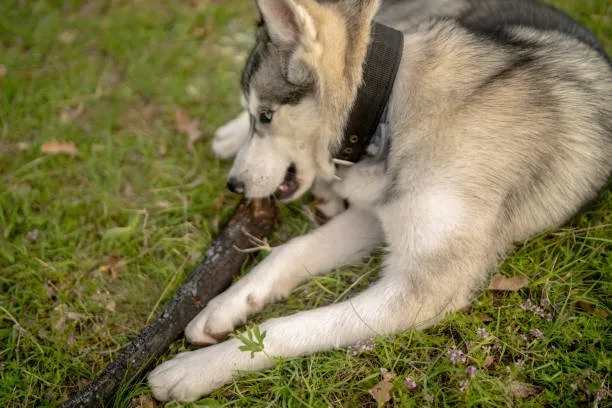
The Debate Over Dry vs. Wet Food
On Quora about: What to feed a siberian husky puppy
When it comes to deciding what to feed a Siberian Husky puppy, the debate over dry vs. wet food is a common consideration for pet owners.
Dry kibble offers convenience and can contribute to dental health by reducing plaque and tartar buildup. It also tends to be more cost-effective and has a longer shelf life, making it a practical option for many Husky owners.
On the other hand, wet food can be more palatable for picky eaters and provides added hydration, which is beneficial for Huskies living in warmer climates or those that may have a lower water intake. Additionally, wet food can be easier for older or teething puppies to consume.
However, it is important to note that wet food typically comes in cans, which can be less convenient to store and may be more expensive than dry kibble.
Having explored the dietary options for your Siberian Husky puppy, ensure their well-being doesn't stop there; managing their temperature is equally crucial. Discover effective strategies for keeping your husky comfortable in warmer climates by reading our article on maintaining a cool environment for your husky.
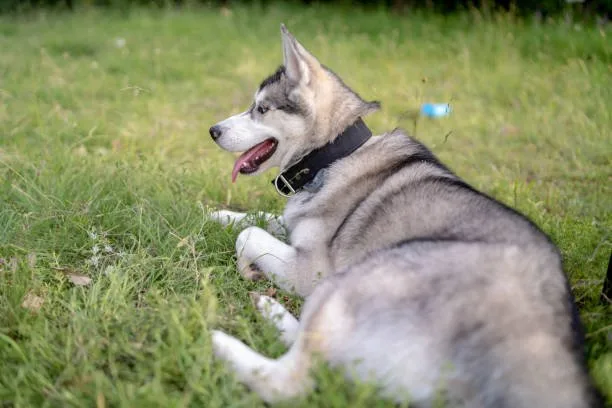
Introducing Raw and Home-Cooked Meals
Siberian Husky puppies can benefit from a diet that incorporates raw food or homemade meals. Raw food diets, including raw meat, bones, and organs, can provide essential nutrients and enzymes that may be lacking in processed foods.
Additionally, home-cooked meals allow owners to have control over the quality and types of ingredients, ensuring a well-balanced and nutritious diet for their growing Husky puppy. However, it is crucial to consult with a veterinarian or canine nutritionist to ensure that the raw or homemade meals meet the specific nutritional needs of a Siberian Husky puppy.
A balanced diet that includes the right proportions of protein, fats, vitamins, and minerals is essential for the puppy’s overall health and development. Remember, it’s important to avoid including any harmful foods and to properly handle raw meat to prevent the risk of bacterial contamination.
Providing raw or home-cooked meals requires careful planning and preparation to ensure that your Husky receives all the necessary nutrients for optimal growth and well-being.
Reddit What to feed a siberian husky puppy
When considering raw or home-cooked meals for your Siberian Husky puppy, consult with a veterinarian or canine nutritionist to ensure the diet meets their specific nutritional needs.
To explore the seasonal nuances of your Husky's nutrition and how it might align with their shedding patterns, delve into our comprehensive article on their shedding schedule. Gain insights into the optimal care for your Husky by reading Husky Shedding Cycles and Care.
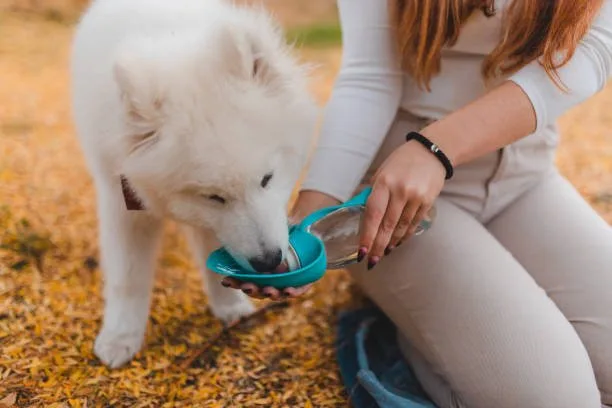
Avoiding Foods That Are Harmful to Puppies
Huskies are known for their high energy levels and playful nature, but they are also susceptible to certain foods that can be harmful to their health. As responsible pet owners, it’s crucial to be aware of the foods that can be toxic to Husky puppies and should be avoided at all costs.
Here’s a list of common foods that are harmful to Siberian Husky puppies:
- Chocolate: Chocolate contains theobromine, which is toxic to dogs and can lead to various health issues.
- Grapes and Raisins: Even small amounts of grapes or raisins can cause kidney failure in Huskies.
- Onions and Garlic: Both onions and garlic can cause damage to a Husky’s red blood cells, leading to anemia.
- Avocado: Avocado contains a substance called persin, which can be harmful to dogs if consumed in large amounts.
- Macadamia Nuts: Macadamia nuts can result in weakness, vomiting, and hyperthermia in Huskies.
- Xylitol: This artificial sweetener can cause a rapid release of insulin in a dog’s body, leading to low blood sugar levels and potential liver damage.
It’s important for Husky puppy owners to be proactive in protecting their pets from these harmful foods. By being mindful of what to feed a Siberian Husky puppy, their overall health and well-being can be safeguarded..
Protecting your Husky's health by avoiding these harmful foods is just the first step to ensuring their well-being. Dive deeper into the world of Huskies and discover the financial considerations of ownership in our comprehensive guide, "Husky Care Expenses."

Feeding Schedule: How Often to Feed Your Husky Puppy
Siberian Husky puppies require a consistent feeding schedule to maintain their health and facilitate training. What to feed a Siberian Husky puppy is important, but so is understanding when and how often to feed them.
Experts recommend providing three meals a day for young Husky puppies, typically around 8 to 12 weeks old. As they mature, you can gradually transition to two meals a day, around 3 to 6 months of age.
This schedule helps to establish a routine and can aid in house training, as puppies usually need to relieve themselves shortly after eating. It’s crucial to monitor their body condition and adjust portion sizes accordingly as they grow.
Consistency in meal times and portion control will not only support their development but also contribute to a well-rounded and disciplined adult dog. Remember to provide access to fresh water at all times, especially during warmer weather or after activities..
Establishing a regular feeding schedule for your Siberian Husky puppy is essential for their health and helps pave the way for other training activities. For insights on fostering a strong bond and understanding the unique language of your Husky, discover the art of howling together by reading our detailed guide on "Teaching Your Husky to Howl".
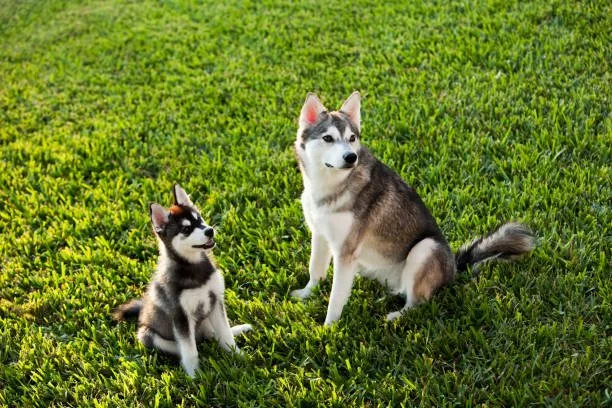
The Nutritional Pillars for High-Energy Husky Puppies
Siberian Husky puppies are known for their high energy levels and rapid growth, necessitating a carefully tailored diet to support their active lifestyle and overall development. What to feed a Siberian Husky puppy should primarily consist of protein-rich food that forms the foundation of their diet.
High-quality animal proteins play a crucial role in muscle development and proper growth. Moreover, incorporating healthy fats into their diet is essential for maintaining coat health and providing the necessary energy for their active lifestyle.
Additionally, ensuring that the balanced puppy food includes a rich blend of essential vitamins and minerals is vital to meet the breed’s high-energy demands while also promoting optimal weight gain. This comprehensive approach to nutrition is pivotal in supporting the specific needs of high-energy Siberian Husky puppies, ultimately contributing to their overall health and well-being.
It is important to prioritize protein-rich food that supports muscle development and proper growth in high-energy Siberian Husky puppies.
Incorporating healthy fats into their diet is essential for maintaining coat health and providing the energy needed for their active lifestyle.
A balanced puppy food should include high-quality animal proteins, healthy fats, and a blend of essential vitamins and minerals to meet the breed’s high-energy demands while maintaining optimal weight gain.
To ensure your energetic Husky pup thrives, a diet enriched with all the right nutrients is key. For comprehensive insights on prolonging the life span of another beloved breed, dive into our detailed guide on maximizing the longevity of Golden Retrievers.
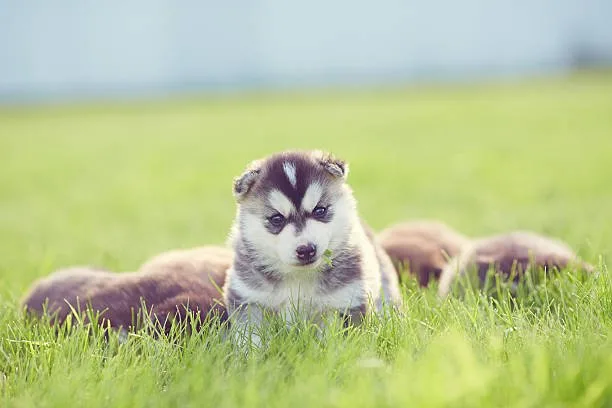
Designing a Husky Puppy Feeding Schedule for Optimal Health
When it comes to ensuring the optimal health of your Siberian Husky puppy, designing a well-structured feeding schedule is crucial. This schedule should align with their developmental needs, providing them with the necessary nutrients and energy at the right times.
It’s essential to establish guidelines for portion control, as overfeeding can lead to obesity and health issues in the long run. Additionally, determining the feeding frequency for puppies is important, as their smaller stomachs may require more frequent, smaller meals throughout the day.
Monitoring your Husky puppy’s growth is an integral part of their care.
Using a feeding chart specifically designed for Husky puppies can help you track their development and ensure they are growing at a healthy rate. Adequate hydration is also vital, especially for active Husky puppies, so always make sure they have access to clean water.
When incorporating puppy teething treats into their diet, it’s essential to choose options that are safe and appropriate for their age and chewing behavior.
These treats can help soothe their teething discomfort and provide them with mental stimulation. By following a carefully designed feeding schedule, you can help your Husky puppy thrive as they grow and develop.
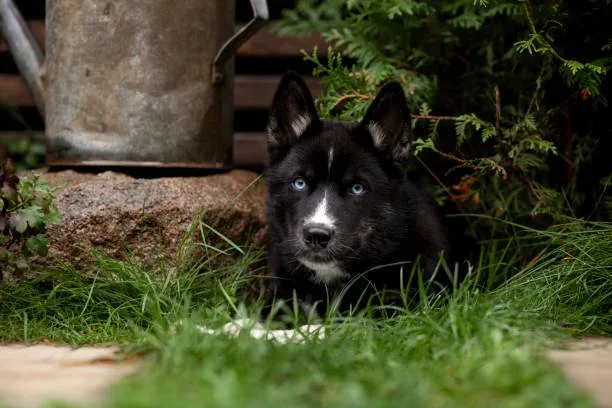
Navigating the Array of Husky-Specific Puppy Food Options
Siberian Husky puppies have specific dietary needs, and choosing the right food is crucial for their overall health and well-being. When deciding what to feed a Siberian Husky puppy, it’s essential to consider the variety of available puppy food options.
Look for commercial puppy foods that are specifically formulated for Huskies and consider grain-free options to cater to potential food allergies. Additionally, exploring the inclusion of raw diet components in their meal plan can provide an added nutritional benefit.
When selecting quality kibble for Husky puppies, prioritize high-quality animal proteins and ensure the provision of safe fruits and vegetables to support their overall health. Don’t forget to consider nutritional supplements to meet the breed’s high-energy demands while maintaining optimal weight gain.
It’s important to consult with a veterinarian to ensure that your Husky puppy’s specific dietary needs are being met..
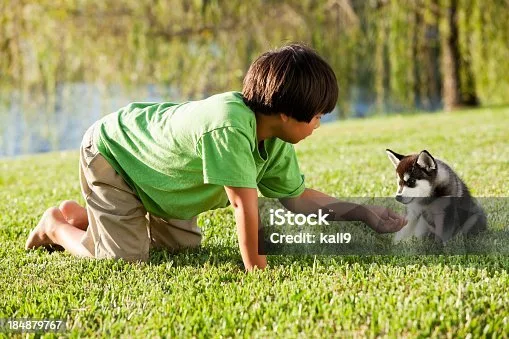
Ensuring a Smooth Dietary Transition from Puppyhood to Adulthood
As a Siberian Husky puppy grows into adulthood, the transition from puppy-specific diets to adult dog food is essential for their long-term health. The process requires careful consideration of age-appropriate feeding strategies and the timing for transitioning.
It’s important to identify the right time for this shift, typically around 12 months of age, to ensure optimal nutrition as they enter adulthood. Adjusting portion sizes during this transition is crucial to prevent obesity in Huskies and to support their continued muscle development.
Moreover, ensuring that the switch to adult dog food provides an adequate supply of DHA is important for their ongoing brain development. This nutrient is essential for maintaining cognitive function, making the smooth dietary transition from puppyhood to adulthood vital for the Husky’s overall health and well-being.
When it comes to transitioning a Siberian Husky puppy from puppy-specific diets to adult dog food, it’s crucial to consider age-appropriate feeding strategies and the timing for the shift, typically around 12 months of age.
The process also involves adjusting portion sizes to prevent obesity in Huskies and to support their continued muscle development as they mature.
Furthermore, ensuring that the switch to adult dog food provides an adequate supply of DHA is essential for ongoing brain development, ultimately contributing to the maintenance of their overall health.
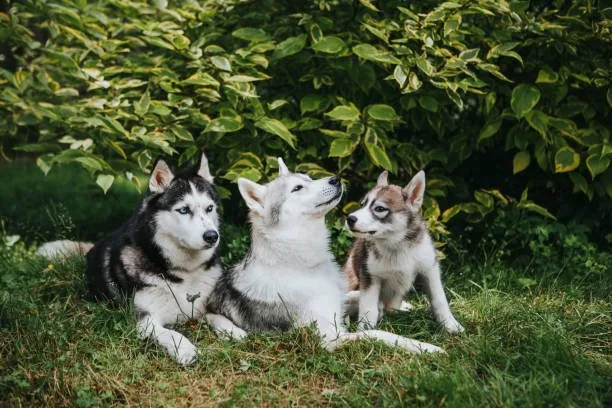
Transitioning Your Puppy to Adult Dog Food
Feeding your Siberian Husky puppy a nutritious and balanced diet is essential for their overall health and well-being. As your puppy grows and matures, there will come a time when a transition to adult dog food is necessary.
What to feed a Siberian Husky puppy during this transition phase is crucial, and it’s important to do so gradually to avoid any digestive upset. When your Husky puppy reaches around 12 months of age, it’s generally advisable to begin the shift to adult dog food.
Start by mixing small amounts of the new adult formula with their existing puppy food, gradually increasing the proportion of adult food over the course of a week or two. This gradual transition helps your Husky’s digestive system adapt to the new food without causing any distress.
Keep a close eye on their weight and overall condition during this transition period, ensuring that they maintain a healthy appetite and energy levels. Always consult with your veterinarian for guidance specific to your Husky puppy’s individual needs when making this dietary change.
Remember, a smooth transition to adult dog food sets the stage for your Husky’s ongoing health and nutrition as they enter adulthood..

Leave a Reply